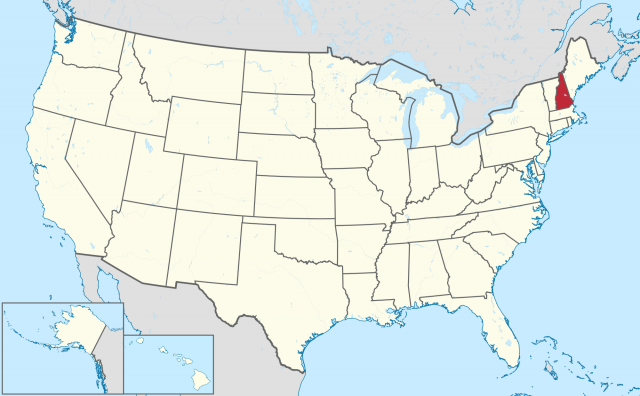New Hampshire
LOCATED IN THE northeastern UNITED STATES, the state of New Hampshire has a total area of 9,304 square mi (23,380 square km) of land and 277 square mi (23,3380 square km) of inland water, with its geographic center lying in Belknap County, 3 mi (5 km) east of the town of Ashland. New Hampshire is bordered on the north by the Canadian province of Quebec, on the east by state of MAINE, on the south by MASSACHUSETTS, and on the west by VERMONT. New Hampshire is one of six New England states (the others being Maine, Massachusetts, Vermont, RHODE ISLAND, and CONNECTICUT). New Hampshire's highest point is Mount Washington, which rises to 6,288 ft (1,918 m) above sea level, and measures 190 mi long by only 70 mi wide. The state's population is 1,185,000. New Hampshire has a small area along the ATLANTIC OCEAN, with the seaport at Portsmouth.
Five of New England's major streams originate in the hills of New Hampshire, which has resulted in the state's being nicknamed the “Mother of Rivers.” The Connecticut River rises in its north; the Merrimack River rises in the Franconia Mountains; the Piscataqua River forms at Dover; and the rivers Androscoggin and Sacco flow east to Maine, becoming two principal rivers of that state. New Hampshire has some 1,300 lakes and ponds and about 40 rivers.

New Hampshire has a dynamic climate. Its proximity to the ocean and its mountains, lakes, and rivers keep its temperature in almost constant flux. The state experiences all four seasons, with wonderful autumn foliage and long, cold winters. Some of the coldest temperatures and strongest winds ever recorded in the continental United States have been observed in New Hampshire. Spring and summer, on the other hand, are short and cool.
New Hampshire contains many forests, abundant with all types of flora, such as elm, maple, beech, oak, pine, hemlock, and fir trees, as well as rare forms such as the balsam fir, willow, dwarf birch, Labrador tea, and Alpine bearberry. The state is also known for its wildlife. Mammals include white-tailed deer, muskrat, beaver, porcupine and snowshoe hare. Some of New Hampshire's wildlife is endangered, including the bald eagle, lynx, and Atlantic salmon.
New Hampshire's nickname is the “Granite State” because of its many granite mountains. Tourist attractions bring 1 million visitors every year, visiting mountain, lake and seashore scenery. Because of its fertile soil, New Hampshire is also famous for its horticulture, such as apples, strawberries, blueberries and peaches. New Hampshire is known as a socially conservative state with an independently minded populace that reflects its motto, “Live Free or Die.”